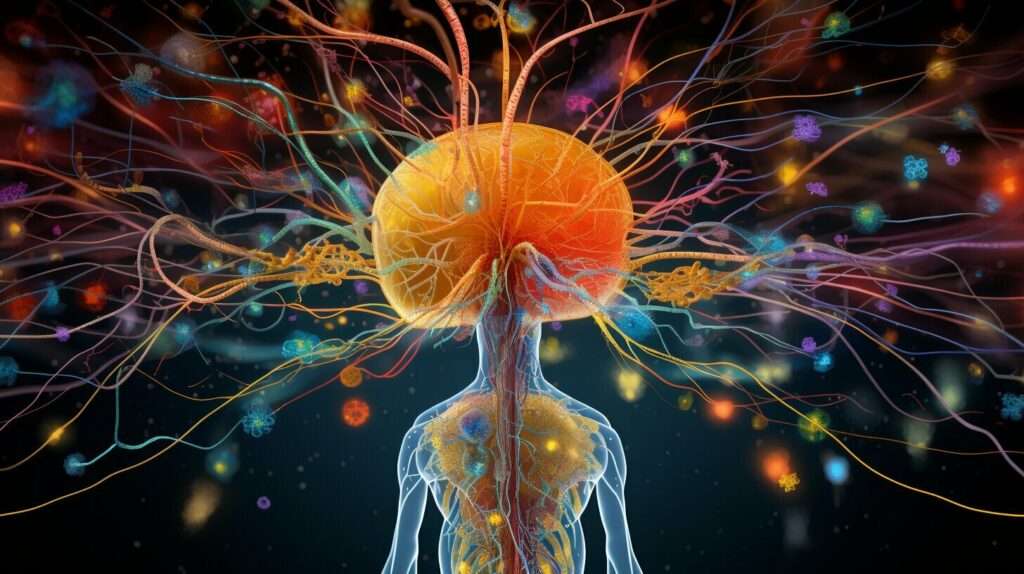Did you know that your gut health has a significant impact on your mental health? The gut-brain axis, a bidirectional communication pathway between the gut and the brain, plays a vital role in maintaining overall well-being. This communication occurs through the microbiota, the collection of microorganisms living within the gut.
The bacteria within the microbiota have a profound impact on the production of neurotransmitters, such as serotonin and dopamine, influencing mood, emotions, and even cognitive function. Any disruptions to the gut-brain axis and microbiota can lead to psychological health issues and may contribute to the development of mental disorders such as anxiety, depression, and even neurodevelopmental disorders.
In this article, we will explore in detail the connection between gut health and mental health. We will discuss the role of the gut-brain axis, the impact of microbiota on mental wellbeing, and strategies for maintaining a healthy gut. Keep reading to learn more about how taking care of your gut can positively influence your emotional and cognitive well-being.
Key Takeaways:
- The gut-brain axis is a bidirectional communication pathway between the gut and the brain.
- The microbiota within the gut plays a vital role in maintaining overall well-being through neurotransmitter production.
- Disruptions to the gut-brain axis can lead to psychological health issues and contribute to mental disorders.
Understanding the Gut-Brain Axis
The gut-brain axis refers to the bidirectional communication between your gut and your brain. This connection allows your gut to send messages to your brain and vice versa, indicating that the health of your gut has a significant impact on your psychological health.
Research has shown that disruptions in the gut-brain axis can have negative effects on psychological health, including anxiety and depression. Additionally, the gut-brain axis plays a crucial role in maintaining overall bodily homeostasis, including regulating inflammation and immune function.
The enteric nervous system, which is a web of neurons found in the walls of the digestive tract, and the vagus nerve, which runs from the brainstem to the abdomen, facilitate the gut-brain connection. Signals are sent between the gut and brain via neurotransmitters, hormones, and immune molecules.
It’s important to understand the gut-brain axis and its role in maintaining your psychological and overall well-being. By taking care of your gut health, you can keep this connection strong and functioning properly.

“There is no doubt that gut bacteria have an impact on the brain, but we don’t understand it fully yet. It’s a fascinating area of research,” stated Dr. Emeran Mayer, a gastroenterologist and professor at the David Geffen School of Medicine at UCLA.
The Role of Microbiota in Mental Wellbeing
In recent years, research has increasingly focused on the role of the gut microbiome in maintaining overall well-being, including mental health. The microbiome refers to the trillions of microorganisms that reside in the gut and play a crucial role in various bodily functions.
Studies have found that the gut microbiome can affect neurotransmitter production and therefore influence mood and emotions. For example, research has shown that imbalances in the gut microbiome can contribute to the development of anxiety and depression.
One of the key ways that the microbiome impacts mental health is through the production of certain neurotransmitters, such as serotonin and dopamine. These neurotransmitters play a crucial role in regulating mood and emotions, and disruptions in their production can lead to negative mental health outcomes.
Furthermore, the microbiome can also impact the immune system and inflammation levels, both of which have been linked to mental health disorders such as depression and bipolar disorder.
Overall, maintaining a healthy gut microbiome is crucial for optimal mental health and well-being. This can be achieved through a balanced and nutritious diet, regular exercise, and the use of probiotics and prebiotics.

Gut Health and Mental Disorders
Gut health not only affects overall well-being, but it also has a significant impact on mental health. The gut-brain axis plays a vital role in mood regulation, and disruptions in this axis can contribute to the development of mental disorders such as anxiety and depression.
Studies have found that individuals with gut disorders such as irritable bowel syndrome (IBS) have a higher risk of developing anxiety and depression. This is believed to be due to alterations in the gut microbiome and gut inflammation, which can affect neurotransmitter production and brain function.
On the other hand, maintaining a healthy gut through diet and lifestyle changes has been shown to have potential benefits for managing mental disorders. For example, the consumption of prebiotics and probiotics can improve gut microbiota composition, which has been linked to reductions in anxiety and depressive symptoms.
| Mental Disorder | Gut Health Benefits |
|---|---|
| Anxiety | Consuming prebiotics and probiotics can improve gut microbiota composition, which is linked to reductions in anxiety symptoms. |
| Depression | Consuming prebiotics and probiotics can improve gut microbiota composition, which is linked to reductions in depressive symptoms. |
| Neurodevelopmental Disorders | The gut-brain axis has been implicated in neurodevelopmental disorders such as autism spectrum disorder (ASD) and attention-deficit/hyperactivity disorder (ADHD). |
It is important to note that while gut health can have a significant impact on mental health, it should not replace professional medical treatment for mental disorders. However, prioritizing gut health as part of a comprehensive treatment plan can have potential benefits for mental well-being.

Gut Health and Cognition
Do you struggle with concentration or find it difficult to remember information? Your gut health may be to blame. Studies have shown that the gut microbiome can have a significant impact on cognitive function.
The gut-brain axis plays a key role in this connection, as the microbiota in the gut communicate with the brain through various pathways.
Research suggests that a healthy gut microbiome can enhance memory, learning, and overall cognitive performance. On the other hand, an unhealthy gut has been linked to cognitive deficits and an increased risk of neurodegenerative disorders such as Alzheimer’s disease.
Additionally, the gut microbiome plays a role in the production of neurotransmitters such as serotonin and dopamine, which are essential for mood regulation and cognitive function. This means that maintaining a healthy gut can not only improve cognitive performance but also positively impact mental health.
To support your gut health and cognitive function, incorporate probiotics and prebiotics into your diet, as well as foods that are high in fiber and polyphenols. Adequate sleep and exercise can also have a positive impact on both gut health and cognitive function.

Remember, a healthy gut is key to maintaining optimal cognitive function and overall well-being.
Strategies for Improving Gut Health
If you’re looking to improve your gut health, there are a few simple strategies you can try. By making some dietary and lifestyle changes, you can promote a healthy gut and improve your overall well-being.
Dietary Recommendations
One of the most effective ways to improve gut health is by making changes to your diet. Here are some dietary recommendations:
- Increase your fiber intake: Fiber is essential for maintaining a healthy gut. Aim to consume at least 25–30 grams of fiber per day.
- Eat probiotic-rich foods: Probiotics help to promote a healthy balance of bacteria in the gut. Include foods like yogurt, sauerkraut, and kefir in your diet.
- Include prebiotic foods: Prebiotics are a type of fiber that feed the good bacteria in your gut. Foods like garlic, onions, and bananas are great sources of prebiotics.
- Avoid processed foods: Processed foods are often high in sugar and unhealthy fats, which can disrupt gut health. Opt for whole, nutrient-dense foods instead.
Remember, it’s important to make dietary changes gradually in order to avoid digestive discomfort.
Lifestyle Changes
In addition to dietary changes, there are several lifestyle changes you can make to support a healthy gut:
- Manage stress: Chronic stress can have a negative impact on gut health. Incorporate stress-reducing activities into your daily routine, such as yoga or meditation.
- Get regular exercise: Physical activity helps to promote a healthy gut by increasing blood flow and stimulating digestion.
- Get enough sleep: Poor sleep quality can disrupt gut health. Aim for 7-8 hours of quality sleep every night.
- Avoid smoking and excessive alcohol consumption: Both smoking and excessive alcohol consumption can damage the gut microbiome and promote inflammation.
Probiotics and Prebiotics
Probiotics and prebiotics can be helpful supplements for improving gut health. Probiotics are live bacteria that can help to promote a healthy balance of bacteria in the gut, while prebiotics are a type of fiber that feeds the good bacteria in the gut.
You can find probiotics and prebiotics in supplement form, or you can consume them through probiotic-rich foods and prebiotic-rich foods, respectively.

Improving your gut health can have a significant impact on your overall well-being. By making dietary and lifestyle changes, and incorporating probiotics and prebiotics into your routine, you can promote a healthy gut and improve your mental and physical health.
Gut Health and Lifestyle Factors
Your lifestyle can significantly impact your gut health, which in turn affects your mental well-being. Managing your stress levels, ensuring adequate sleep, and engaging in physical activity can all promote a healthy gut. Here are some strategies for optimizing your lifestyle to maintain gut health:
- Reduce stress: Chronic stress can disrupt the gut microbiome and increase inflammation. To manage stress levels, consider practicing relaxation techniques such as deep breathing, meditation, or yoga.
- Get enough sleep: Sleep is essential for gut health, as it allows the body to repair and regenerate. Aim for at least 7-8 hours of uninterrupted sleep each night.
- Stay active: Regular physical activity can promote gut motility, improve digestion, and reduce inflammation. Aim for at least 30 minutes of moderate exercise most days of the week.
By prioritizing these lifestyle factors, you can support a healthy gut microbiome and improve your mental well-being.

Gut Health and Medications
It’s important to consider the impact of medications on gut health and overall well-being. Some medications, such as antibiotics and proton pump inhibitors, can disrupt the gut microbiome and lead to digestive issues.
In addition, some medication side effects, such as nausea and diarrhea, can also affect gut health. It’s important to talk to your healthcare provider about any concerns you have regarding medication and gut health.
When discussing medication options with your healthcare provider, be sure to ask about potential side effects on gut health. They may be able to suggest alternative medications or strategies to mitigate any potential negative effects.
It’s also important to note that while some medications can have negative effects on gut health, others may actually have positive effects. For example, some antidepressants have been shown to improve gut health by increasing the production of certain gut bacteria.
Overall, it’s important to have open and honest communication with your healthcare provider about any concerns you have regarding gut health and medication. By working together, you can find the best treatment options for your overall well-being.

Gut-Brain Connection and Emotional Well-being
Did you know that your gut health can also impact your emotional well-being? Your gut and brain are connected through the vagus nerve, which means that the state of your gut can affect your mood and emotions. Research has shown that a healthy gut can contribute to improved emotional well-being, stress management, and resilience.
The gut-brain axis plays a crucial role in regulating stress response, and disruptions to this axis have been linked to mood disorders such as anxiety and depression. This may be because a healthy gut microbiome can produce neurotransmitters that influence mood, such as serotonin and dopamine.
Stress can also have a significant impact on gut health. When you’re stressed, your body produces more cortisol, which can disrupt the balance of bacteria in your gut and lead to inflammation. This can contribute to a variety of physical and mental health issues, including mood disorders.

Fortunately, there are steps you can take to support your gut-brain connection and promote emotional well-being. Eating a balanced, nutrient-rich diet, getting plenty of sleep, and managing stress through relaxation techniques like meditation or yoga can all contribute to a healthy gut and improved emotional health.
Additionally, probiotics and prebiotics can be helpful in supporting a healthy gut microbiome. Probiotics are live bacteria that can provide additional beneficial bacteria to your gut, while prebiotics are the food that these bacteria feed on. Incorporating fermented foods like yogurt, kefir, or kimchi into your diet can also be a good way to support gut health.
By prioritizing your gut health, you can support not only your physical health but also your emotional well-being. Remember, a healthy gut leads to a happy brain.
Gut Health and Mental Health: Key Takeaways
As you have learned throughout this article, the connection between gut health and mental health is significant. The gut-brain axis plays a crucial role in maintaining overall well-being, and disruptions in this communication can impact psychological health. The microbiota in the gut also plays a key role in maintaining mental well-being, affecting neurotransmitter production and influencing mood and emotions.
There is a strong relationship between gut health and mental disorders such as anxiety, depression, and even neurodevelopmental disorders. However, maintaining a healthy gut can have potential benefits for managing these conditions.
Additionally, gut health can also impact cognitive function, enhancing concentration, memory, and overall cognitive performance.
To improve gut health, it is important to incorporate dietary recommendations, lifestyle changes, and probiotics and prebiotics into your daily routine. Managing lifestyle factors such as stress, sleep, and physical activity can also have a positive impact on gut health and overall well-being.
It is important to be aware that certain medications can disrupt the gut microbiome and potentially impact mental health. Discussing gut health with healthcare professionals when considering medication options is crucial.
Overall, prioritizing gut health is essential for both emotional well-being and cognitive function. By maintaining a healthy gut, you can improve your overall quality of life and mental health.

Conclusion
Throughout this article, we’ve explored the significant impact of gut health on mental health. We learned about the gut-brain axis and how disruptions in this connection can impact psychological health. We also delved into the role of microbiota in maintaining mental wellbeing, and how a healthy gut can help manage conditions such as anxiety and depression.
Furthermore, we discussed how a healthy gut can enhance cognitive function, including concentration, memory, and overall performance. We provided practical tips and strategies for improving gut health, such as dietary recommendations, lifestyle changes, and the importance of probiotics and prebiotics.
It’s important to note that factors such as stress, sleep, and physical activity can also impact gut health, and that certain medications can disrupt the gut microbiome. By discussing gut health with healthcare professionals, we can make informed decisions that prioritize our overall well-being.
The gut-brain connection also plays a significant role in emotional well-being, stress management, and resilience. By prioritizing gut health, we can improve our emotional well-being and overall quality of life.
Remember:
Gut health is a crucial aspect of overall well-being, including mental health and cognitive function. By making small but impactful changes to our diet and lifestyle, we can improve our gut health and reap the benefits of better mental and emotional health. Take charge of your gut health today.
FAQ
Q: What is the gut-brain axis?
The gut-brain axis refers to the complex bidirectional communication system between the gut and the brain. It involves various pathways, including neural, hormonal, and immune mechanisms.
Q: How does the gut microbiota impact mental wellbeing?
The gut microbiota plays a crucial role in maintaining mental wellbeing. It influences neurotransmitter production, such as serotonin and dopamine, which are essential for regulating mood and emotions.
Q: Can gut health affect mental disorders?
Yes, there is a connection between gut health and mental disorders. Research suggests that imbalances in the gut microbiome may contribute to conditions like anxiety, depression, and neurodevelopmental disorders.
Q: Does gut health impact cognitive function?
Yes, gut health can influence cognitive function. A healthy gut has been linked to improved concentration, memory, and overall cognitive performance.
Q: What are some strategies for improving gut health?
To improve gut health, it is recommended to incorporate dietary changes such as consuming fiber-rich foods, probiotics, and prebiotics. Lifestyle factors like managing stress, getting enough sleep, and engaging in physical activity also play a role.
Q: How do lifestyle factors affect gut health?
Lifestyle factors like stress, sleep, and physical activity can impact gut health. Managing these factors is crucial for maintaining both gut and mental wellbeing.
Q: Can medications affect gut health?
Yes, certain medications can disrupt the gut microbiome, potentially impacting mental health. It is important to discuss gut health with healthcare professionals when considering medication options.
Q: How does the gut-brain connection relate to emotional well-being?
The gut-brain connection has an emotional component. A healthy gut can contribute to improved emotional well-being, stress management, and resilience.
Q: What are the key takeaways regarding gut health and mental health?
The key takeaways are that gut health has a significant impact on mental health, and maintaining a healthy gut is essential for overall well-being.
Q: What is the conclusion of the article?
In conclusion, gut health has a profound impact on mental health. The interconnectedness between gut health and mental health highlights the importance of prioritizing gut health for cognitive function and emotional well-being.






